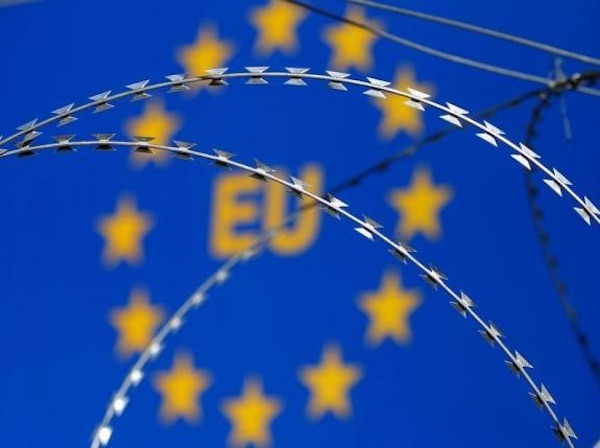
Sinn Fein’s Deputy First Minister at Stormont, Martin McGuinness, has said the new British Prime Minister is on a collision course with the European Union over its approach to what he described as a “disastrous decision” to leave the EU.
Speaking on RTE news, he said the real problem for Theresa May would be respecting the democratic wishes of the people of Scotland and the north of Ireland.
There is nothing united about the ‘United Kingdom’, he said, and there are “challenging and difficult times” ahead in relation to a debate surrounding a hard border.
“The Brits will make a huge argument for a hard border, not just between North and South, but for the island of Ireland and Britain,” he warned. The Conservatives do not “give a damn” about anybody on the island of Ireland, and the outcome of the referendum represents a “clear undermining” of the 1998 Good Friday Agreement.
He describing “the time ahead” as a “messy business” and urged the Dublin government to “stand up” for the democratically expressed wishes of the people of north of Ireland who see their future in Europe.
And he directly challenged Prime Minister Theresa May yesterday to respect the majority will in the north to remain in the EU. The deputy first minister said he spoke to her as James Brokenshire was revealed as the new British Direct Ruler in the north of Ireland. Mr McGuinness told the prime minister he and others had “huge concerns” about the potential for a hard border stretching from Derry to Newry.
“Theresa May is on record during her time as home secretary as saying that Brexit would inevitably lead to new border controls in Ireland,” he said. “It would be a hugely backward step and would represent a fundamental undermining of the Good Friday Agreement.”
The former Sinn Fein negotiator said Brexit would be “economically and socially disastrous” for the island and there was a duty on political leaders to do “all we can to protect our people”.
“I told Theresa May in no uncertain terms that the way to do that is by respecting the democratically expressed will of the people here to remain in the EU.”
Italy’s foreign affairs minister has already warned of the “dangerous consequence” of imposing new border controls, while the 26 County foreign affair minister Charlie Flanagan told foreign diplomats that the European Union should be “sensitive” to the desire in the South to preserve what he called an “invisible border” with the Six Counties.
However, German chancellor Angela Merkel was non-committal over the State’s Brexit concerns following talks with Taoiseach Enda Kenny in Berlin. She said that Dublin’s voice will be heard “as much as anyone else’s” in the upcoming talks between the EU and London.
Meanwhile, Gerry Adams has repeated calls for referenda on unification in both parts of the island following the vote to leave the EU and has called on America’s leaders to help “safeguard the political progress” in the north of Ireland.
In an article for the New York Times, he said that the solution to the problem would be for a referendum about a united Ireland.
He said: “The Brexit vote provides both a reason and an opportunity to enable this democratic decision. The British government should respect the popular vote in the North for European Union membership by bringing forward a referendum on Irish unity. The Irish government, too, should act on this.
“The people of the North could then choose whether they wanted to be part of a Britain outside the European Union or belong to a unified Irish state in Europe. For the Irish after Brexit, that is the democratic way forward.”
Mr Adams added that the “achievement and legacy” of the Good Friday Agreement had been put “at risk” by Brexit.
He said: “By its reckless action, the British government has set aside the democratic consent that was central to the Good Friday Agreement and set a course that would fundamentally alter the relationships between the North and South of Ireland, and between Ireland and Britain.”
He has called on America’s leaders to act to “safeguard the political progress” in the north of Ireland.
“Successive presidents of the United States, with the support of Irish-Americans, have played a central role in promoting political progress in the North of Ireland,” he said.
“Given its investment in the peace process, America’s leaders must act to safeguard it, insisting that the British government honor its obligations under the agreements and give effect to the North’s choice to remain.”
![[Irish Republican News]](https://republican-news.org/graphics/title_gifs/rn.gif)
![[Irish Republican News]](https://republican-news.org/graphics/title_gifs/harp.gif)

